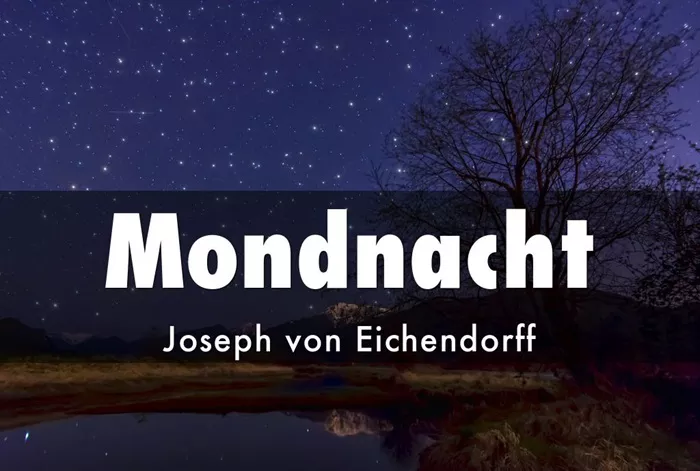Welcome to Poem of the Day – Mondnacht by Joseph von Eichendorff.
Mondnacht, written by Joseph von Eichendorff, is one of the most beloved and celebrated poems in German Romanticism. It embodies the themes of longing, unity with nature, and transcendence, which are central to the Romantic literary movement. Through its imagery, structure, and tone, Mondnacht transports readers to a realm where earthly and spiritual worlds converge, creating an almost dreamlike experience. In this essay, we will explore the poem’s content, themes, and significance, with a detailed analysis of its language and underlying meaning.
Mondnacht Poem
Es war, als hätt’ der Himmel
Die Erde still geküsst,
Dass sie im Blüten-Schimmer
Von ihm nun träumen müsst’.
Die Luft ging durch die Felder,
Die Ähren wogten sacht.
Es rauschten leis die Wälder,
So sternklar war die Nacht.
Und meine Seele spannte
Weit ihre Flügel aus,
Flog durch die stillen Lande,
Als flöge sie nach Haus.
Mondnacht Poem Explanation
1. Structure and Form
Mondnacht is composed of three stanzas, each consisting of four lines. The poem follows a regular rhythm and rhyme scheme, which lends it a musical, almost hypnotic quality. The simplicity of the structure mirrors the stillness and serenity of the night it describes, inviting readers to linger in its world.
2. Themes
The central themes of Mondnacht include the following:
Union of Heaven and Earth: The opening lines suggest a mystical connection between the celestial and terrestrial realms, symbolized by heaven kissing the earth. This act of unity reflects a Romantic ideal of harmony in nature, where physical and spiritual worlds are intertwined.
Nature as a Mediator of Emotion: The natural imagery—the fields, woods, and starry night—serves as a reflection of the speaker’s internal state. The external serenity and beauty of the night parallel an inner sense of peace and transcendence.
Longing and Transcendence: The poem culminates in an expression of the soul’s yearning to transcend earthly bounds and return to its true home. This “home” can be interpreted as a spiritual realm, suggesting a Romantic preoccupation with the infinite and the divine.
3. Imagery
Eichendorff’s imagery is rich and evocative, creating a vivid sensory experience:
“As if heaven softly kissed the earth”: This image of tenderness establishes a mood of quiet intimacy, as though the universe itself participates in a gentle, loving act.
“Shimmer of blossoms”: The use of light and floral imagery evokes both fragility and beauty, underscoring the ethereal quality of the scene.
“The woods softly rustled”: The auditory imagery enhances the immersive experience of the poem, inviting readers to feel the night as a living, breathing entity.
4. Tone
The tone of Mondnacht is contemplative and reverent. It invites the reader to pause and reflect on the interconnectedness of all things—earth, heaven, and the human soul. This quiet awe is characteristic of the Romantic movement, which sought to capture the sublime in both nature and human experience.
Interpretation
Mondnacht is more than a description of a peaceful night; it is a meditation on existence and belonging. The poem’s central metaphor—heaven kissing the earth—suggests a reunion of opposites, a theme deeply rooted in Romantic thought. For the Romantics, the world was not merely a physical place but a manifestation of divine unity and purpose.
The final stanza introduces a deeply personal element: the speaker’s soul takes flight, seeking a home. This flight can be interpreted in several ways:
Spiritual Transcendence: The soul’s journey may represent a longing for divine connection, a return to the eternal source from which it originated.
Death and Eternal Rest: Some interpretations suggest that the soul’s flight symbolizes death, not as an end but as a return to the comfort of a universal “home.”
Inner Harmony: On a psychological level, the poem may express a moment of profound inner peace, where the boundaries between self and the world dissolve.
Romantic Context
Mondnacht exemplifies key Romantic ideals:
Pantheism: The poem reflects a view of nature as imbued with spiritual significance. The kiss between heaven and earth suggests a divine presence in the natural world.
Emotion Over Reason: The poem prioritizes feeling and intuition over rational analysis. It invites readers to experience its beauty emotionally rather than dissect it intellectually.
The Sublime: Romanticism often sought to capture the sublime—moments of overwhelming beauty or grandeur that transcend human comprehension. Mondnacht achieves this through its portrayal of a serene yet infinitely vast night.
Conclusion
Mondnacht is a masterpiece of Romantic poetry, celebrated for its delicate beauty and profound depth. Through its seamless blend of natural imagery, spiritual longing, and musical language, Eichendorff creates a timeless meditation on the interconnectedness of existence. The poem resonates with readers across generations, offering a moment of stillness and transcendence in a chaotic world. By capturing the essence of Romanticism, Mondnacht reminds us of the beauty and mystery that surround us, waiting to be rediscovered in moments of quiet reflection.

